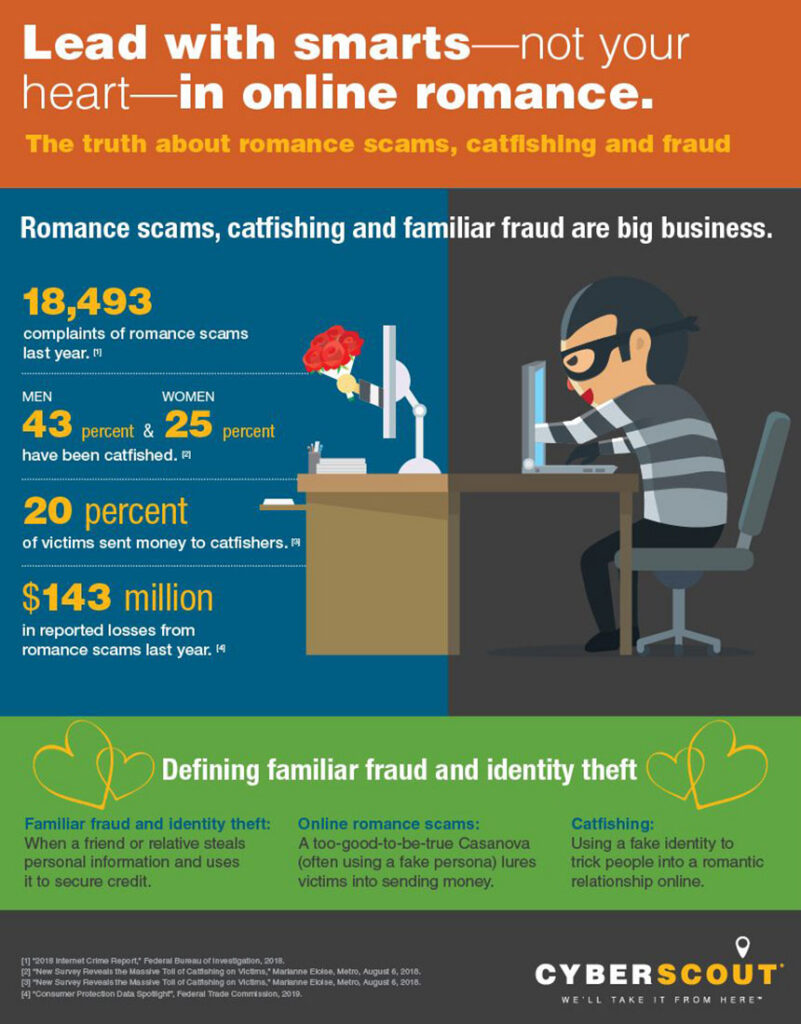
How to Avoid Familiar Fraud and Romance Scams
Online dating use spikes during the December holidays through valentine’s day, and you know the old saying “you always hurt the ones you love.” That’s an understatement when it comes to the deception and betrayal caused by familiar fraud and romance scams. Unfortunately, both are all too common—and never more so than in the realm of online dating.
Earlier this year, the FBI issued a special cyber alert to online daters as organized criminals drove up the rate of dating website fraud by 70% over the prior year.1 Americans lost an astounding $362 million to confidence/romance scams last year.2
When it comes to the heart, you need to lead with your smarts. Be on the lookout for these common types of romance and familiar fraud:
Familiar identity fraud: A friend or family member applies for loans or credit cards using your personal information.
Catfishing: Catfishing occurs when someone sets up a too-good-to-be-true online persona to attract romantic partners. Sometimes it’s done as a prank, but more often, it has nefarious motivations, which can include stalking, identity theft, fraud or revenge.
Romance scams: You’ve met your perfect match, and you want to meet in person. There’s just one problem—he or she needs money for travel expenses. In a typical romance scam, you get swept off your feet by skillful online seduction. Requests for money quickly follow.
Victims of Familiar Fraud
Betrayal by people you trust and love can hurt more than the damage to your credit score. These groups are most vulnerable to familiar identity fraud:
Children under the age of eight are particularly susceptible to familiar fraud, often by a parent. It can go unnoticed for a long time.
College students are more likely to have relatives steal their identities, but they also need to be careful about snooping roommates and unscrupulous new friends.
Seniors are primary targets for romance scammers, since many spend a significant amount of time alone and are increasingly online.
Spouses or significant others sometimes use identity fraud to get loans to cover up financial mistakes or mismanagement or to hurt each other during a divorce.
12 Romance Scam Red Flags for Online Daters
1. The individual’s online profile seems too-good-to-be-true or photos seem staged or like they are of professional models.3
2. The individual’s online dating profile contains plagiarized content that appears on multiple dating profiles for different people.
3. The individual claims to be highly educated, wealthy, and so forth, but the profile is littered with poor grammar, misspellings, etc.
4. The individual’s social media profile is very sparse, generic or lacks historical posts.
5. The individual’s dating profile and social media don’t seem to align with each other.
6. The individual seems to be rushing the relationship—asking you lots of questions and proclaiming his/her love.
7. The individual claims not to have or be able to use video chat services such as Skype, so you never get to see him or her.4
8. You complete a Google reverse image search of the individual’s photo and find it belongs to more than one person. Catfishers assume identities with random photos of attractive people.
9. The individual tries to drive a wedge between you and your friends or family.
10. The individual wants you to communicate directly outside the online dating service through email, instant messaging apps or texts.5
11. You request an in-person date, but the individual keeps coming up with last-minute excuses, often claiming to have an important job that requires world travel.6
12. The individual asks you to send money to him or her without ever having met you.
Diamond Credit Union has partnered with CyberScout to offer comprehensive identity management services. If you detect suspicious activity or would like to proactively protect your identity, contact us at 610-326-5490 to be connected to a CyberScout fraud expert.
LEARN MORE ABOUT CYBERSCOUT AT DIAMOND

